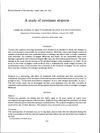Novel Cycle Changes in Scalp Hair Are Caused by Etretinate Therapy
March 1995
in “
British Journal of Dermatology
”

TLDR Etretinate therapy can cause hair loss by disrupting the hair growth cycle.
In 1995, a study involving 15 patients treated with etretinate for at least 6 months found that the therapy caused a sustained and progressive decrease in the anagen phase duration, leading to increased hair shedding. The study proposed two novel mechanisms for etretinate-induced alopecia: an arrest at the onset of anagen and a defect in follicular anchorage during telogen. These findings, based on the analysis of shed hair rate, plucked telogen counts, and new anagen hairs, suggest that etretinate affects the hair cycle in previously undescribed ways. Despite the small sample size, the results were significant, indicating that etretinate may have multiple effects on the hair cycle, potentially through different mechanisms. Further research was recommended to address the adverse effects of etretinate on hair.




